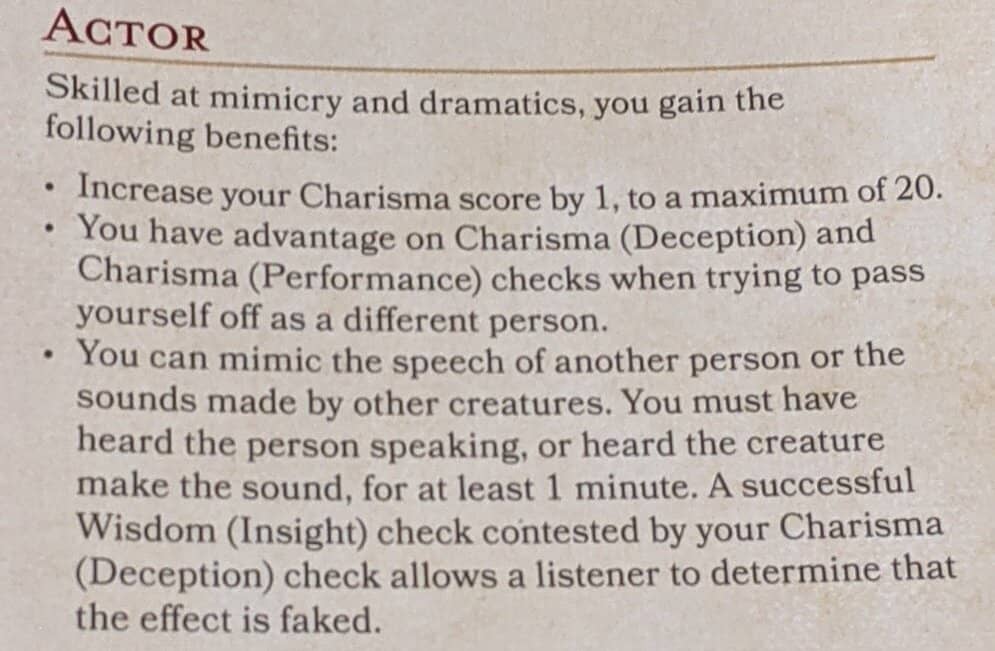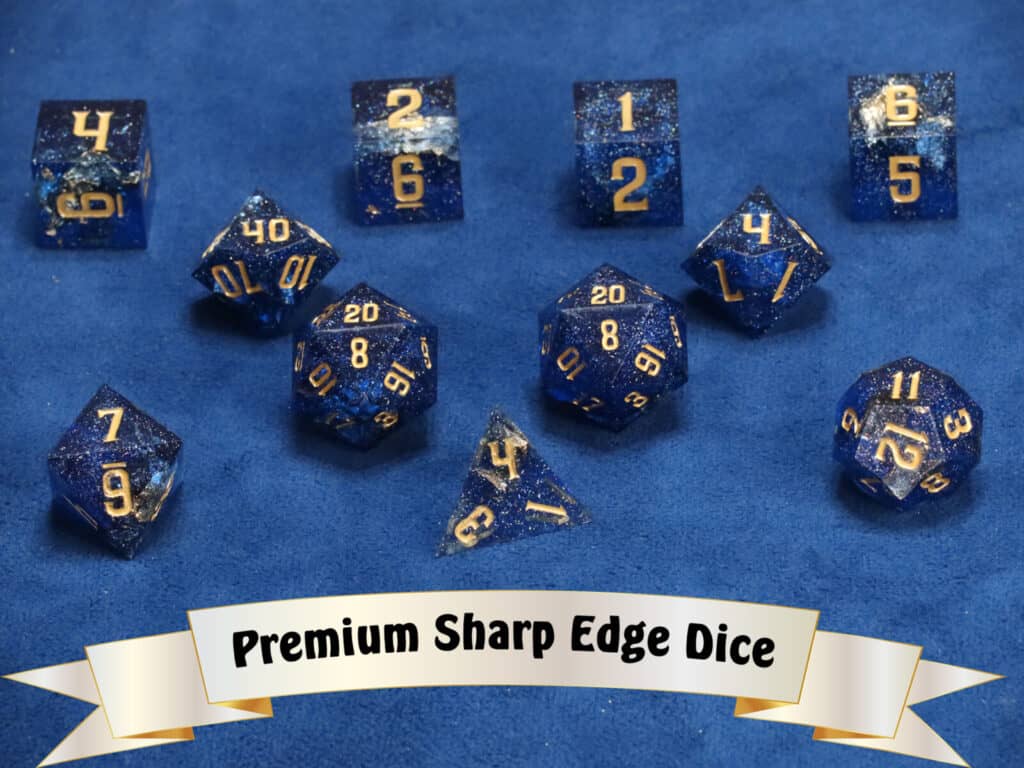The 5e actor feat is a favorite of bards, rogues, and general troublemakers alike. One of the feats that offers a plus one ability boost (Charisma in this case), the additional benefits of picking this feat may convince many players that it’s a better option than going with a split ability score improvement instead.
The Actor feat in 5E D&D is a favorite of rogues, bards, or “face” characters in the party that increases charisma, gives advantage when trying to impersonate someone else, and mimic speech or sound in key situations.
While this might seem like an easy feat to dismiss at first glance, a deeper look at the Actor feat shows why that would be mistake for many players – whether bard, rogue, or something else entirely.

Breaking Down the Actor Feat
Judging the 5E Actor feat begins with understanding it. This is a feat that is really interesting for a creative player, and doesn’t get as much attention as I think it deserves in many D&D groups.
So let’s start with the definition of the Actor feat in 5th edition as it appears in the Player’s Handbook before breaking down each section of what it brings to the table.
Directly from the Player’s Handbook:
Skilled at mimicry and dramatics, you gain the following benefits:
- Increase your Charisma score by 1 to a maximum of 20
- You have advantage on all Charisma checks (deception or performance) when trying to pass yourself off as another person
- You can mimic the speech of another person of the sounds made by other creatures. You must have heard the person speaking, or heard the creature make the sound for at least 1 minute. A successful Wisdom-Insight check contested by your Charisma-deception check allows a listener to determine that the effect is faked.

There are some weak feats that have a plus one ability score and not much else. Fortunately, the actor feat is not one of them.
The plus one to a player’s Charisma stat is further enhanced by the additional benefits that come with being a skilled Actor.
This is a versatile feat that definitely makes sense for a bard or rogue, but can actually be very situationally useful for multiple classes.
Benefit #1: Increasing your Charisma score by 1 as long as you’re not maxed out at 20.
A +1 stat boost is always a good little bonus. This is especially helpful when your character has an odd number in Charisma since this will get you up to the next bonus. Pretty standard for one of these feats, but it’s the rest of the benefits that really help a feat shine since you’re giving up an ability score boost for whatever else the feat brings to the table.
Benefit #2: Advantage on all charisma checks (deception and performance) when you are trying to imitate another person.
This is a great benefit that is situational, but it’s a situation that is often an option in multiple campaigns or situations. Whether a rogue trying to imitate someone to get an in to a private location, a bard mimicking the voice of a superior officer to get some inept guardsman to unlock the tower door, or to draw enemies out to launch an ambush – this is a situational charisma check but it’s one that has a chance to be used in virtually every campaign.
In some campaigns this came up as the best solution multiple times naturally, with players using it in creative ways as a solution to a puzzle or potential problem that I hadn’t considered. Found out as suspected spies deep in the enemy kingdom? Leave it to a bard to play a raunchy song including accurate voice work of the king and queen of their kingdom in mocking tones.
The guards, counter spies, and nobles crack up, give the benefit of the doubt, and then are charmed. Nice work, group.
Point being, this is a specific charisma check that will actually come into play.
Benefit #3: You get the ability to mimic the speech of a person or the sounds made by a creature, as long as you have heard them for at least 1 minute. This skill is contested.
If you don’t have a kenku in the party, and most parties don’t have a kenku, this is an outstanding addition to the feat. A ranger being able to perfectly mimic the battle cry of a local barbarian tribe while throwing his voice – a rogue making the sound of floor boards creaking when he catches stealthy rogues who think they have the drop on his party – a bard behind a covered palanquin imitating the shrill nasally voice of a feared noble man or woman as the party acts as servants carrying them safely past the guards without inspection into the castle.
These are just some of the scenarios where this ability can work well. For a creative party with some spellcasters, the ability to use these voices via magic communication can allow even more creative uses of deception.

5E Classes That Should ALWAYS Take the Actor Feat
This is right in the wheelhouse for an entertainer like a bard and while most rogues would also fit into this category, there are enough different ways to play a rogue that it’s not necessarily a must take. Though considering rogues do get additional ability score increases, this isn’t a bad pick if their charisma is an odd number and they want to add some situational strength to their repertoire.
However, bards hands down should always look at the Actor feat. The boost to charisma is a plus, the feat fits right in with roleplaying as a bard, and chances are the bard is one of the more charismatic members of the party expected to be able to cause mischief and open doors that might otherwise be closed.
Giving a bard advantage on these mimic actions really opens the doors for the party and is yet another tool for a truly great, dare we say epic, performer.
5th Ed Classes that should always take the Actor Feat
- Bards
5E Classes That Should Consider Taking the Actor Feat
Situationally Actor is a feat that has a lot of potential appeal for many different characters. Many rogue builds will want to take this once their DEX is maxed out, and it’s a good pick. Especially for those who sometimes need to get into places where stealth alone might not be quite enough. This is also at least worth a consideration for Charisma based classes like the sorcerer or warlock.
Especially if your tables run like ours where sometimes characters need to double duty. If no obvious conventional charisma class is in the party, everyone starts looking at the warlock and sorcerer to see how to handle things. Any many of ours like to be sneaky.
A sneaky sorcerer or warlock who get caught away from the party might want the ability to mimic voices and sounds to help get out of potentially tight situations if otherwise discovered and hey, charisma is the casting stat.
It may or may not be appropriate for these classes depending on the build, situation, and campaign, but it’s worth taking a look at 5E’s Actor feat if you’re playing one of these classes just to see if it is a good fit for your story and play style.
5th Ed Classes that should strongly consider taking the Actor Feat:
- Rogues
- Rangers acting as scouts
- Any charismatic face of the party, especially if they are forced into roguish situations due to the lack of a rogue
5E Classes That Should NEVER Take the Actor Feat
There are many classes that at first glance, and with most campaigns, will probably never have the Actor feat as a major priority in any 5th Edition game.
In fairness, there are many situational cases where a class that usually would have no use for the actor feat might want it. This could be a charismatic sorcerer who also needs to play the role of face or sneakish rogue in an under-staffed party, or a monk who chooses to get into trouble and thinks he’s more charismatic than he is.
But generally unless there’s an unusual or super specific campaign reason – there’s not a reason for these classes to take this feat unless there’s a very weird build, or everyone rolled for stats and one of these classes ended up being the face.
5th Ed classes that probably never need to take the Actor Feat:
- Artificers
- Barbarians
- Clerics (except for possibly Trickery Domain Clerics)
- Druids
- Fighters
- Monks
- Paladins
- Wizards (unless forced to use illusion magic to act as the deceiver/roguish face of the party)

Final Feat Grade for Actor 5E
Actor Feat Grade: B+
Is the 5E Actor Feat Worth It?
The Actor feat in 5E is a feat that is not going to be useful for every class or game, but when it is useful, it’s incredibly useful, and in the hands of a charismatic and inventive player it can seem outright OP at times.
However, most of the time it plays as a very useful and interesting feat that the charismatic classes or trouble making classes of bard or rogue can use to great advantage.
The advantage on these special deception checks are incredibly strong, because they come on top of a stat (and very likely a skill) that the PC almost certainly is strong in.
Possibly even expert. As a clever bridge for a PC who desperately needs help on the charisma checks it doubles the chances of success by getting that extra die.
For many specialized classes the Actor feat is interesting but not necessarily worth it. However, if you are playing a character where it sounds like some of these benefits are a good idea, then this feat is probably even much stronger for your build than you realize.
All in all that makes the Actor feat a solid B+ as it is strongly above average with a decent amount of versatility, a stat boost, and some really great situational benefits.
Actor Feat FAQ
Is the Actor feat good?
The Actor feat in 5E is definitely above average for situational use. This is not one of those rare “good for every class” feats like Lucky or Alert, nor does it make a particular class potentially OP like Sharpshooter or Spell Sniper. However, for diplomatic, face, or charismatic characters and troublemakers like the rogue or the bard, Actor is an excellent feat that gives extremely useful benefits even above and beyond the +1 CHR boost.
What classes should take the Actor feat in 5E DnD?
Bards for sure should take the Actor feat in any 5E DnD game. Many rogues should also consider it, as well as any warlocks or sorcerers who inexplicably find themselves the face of the party for character interactions.
Do I need the 5e Actor feat to try and imitate an NPC in a dnd campaign?
Unless the DM homebrews the rules otherwise, no. Anyone with a high deception can make the attempt, though it’s impossible to deny that both from a story telling slash roleplaying perspective as well as a mechanical perspective, having all the benefits given by the actor feat definitely helps push the odds in your favor.
Other DnD Articles You Might Enjoy
- Alert Feat 5E
- Athlete Feat 5E
- Arcane Focus Vs Component Pouch
- Best Feats for 5E DnD Players
- Beginner’s Guide to DnD
- Best Feats for Bards


Proud to embrace the locally created moniker of “Corrupt Overlord” from one of the all time great Lords of Waterdeep runs, Shane is one member of the Assorted Meeples crew and will be hard at work creating awesome content for the website. He is a long-time player of board games, one time semi-professional poker player, and tends to run to the quirky or RPG side of things when it comes to playing video games. He loves tabletop roleplaying systems like Dungeons & Dragons, Pathfinder, Werewolf, Fate, and others, and not only has been a player but has run games as DM for years. You can find his other work in publications like Level Skip or Hobby Lark.
